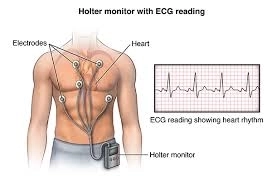
Holter Monitor: Continuous Heart Rhythm Monitoring with Dr. Ahmed Suleiman
Published on: 2025-06-25 | Written by: Dr. Ahmed Suleiman, Head of Cardiology Department at Students Hospital
Dr. Ahmed Suleiman, Head of the Cardiology Department at the Student Hospital, explains that the Holter monitor is one of the most important modern tools for diagnosing cardiac arrhythmias. Unlike a standard ECG that records the heart’s electrical activity at a single moment, the Holter device provides continuous monitoring for a duration ranging from 24 hours up to one full week—allowing for the detection of hidden abnormalities with greater precision.
What Is a Holter Monitor?
It is a small portable device attached to the chest using electrodes that continuously records the heart's electrical signals.
Dr. Ahmed Suleiman notes that the device is worn during normal daily activities without requiring hospital admission, capturing detailed data about the heart’s rhythm during sleep, physical activity, stress, and rest.
When Is the Holter Monitor Used?
The Holter test is recommended in the following cases:
-
Repeated episodes of unexplained palpitations
-
Dizziness or fainting without a clear cause
-
Suspected bradycardia (slow heartbeat) or tachycardia (fast heartbeat)
-
Ongoing monitoring of known arrhythmia cases
-
Evaluating the effectiveness of heart medications or pacemakers
Dr. Ahmed Suleiman highlights that the Holter is especially useful in cases where standard in-office ECG tests show no abnormalities.
How Is the Device Applied?
-
The monitor is installed in the clinic within minutes
-
The patient continues their daily routine as usual
-
Any symptoms are logged by the patient in a provided journal
-
After the test period ends, the data is analyzed with specialized software
According to Dr. Ahmed Suleiman, the device is completely safe and painless, and suitable for all age groups—including elderly patients and children under medical supervision.
Advantages of the Holter Monitor
-
Detects heart rhythm issues not captured by quick exams
-
Can be used for 24, 48 hours, or up to 7 days depending on the case
-
Assesses response to cardiac medications
-
Helps prevent complications like heart attacks or fainting episodes
Dr. Ahmed Suleiman adds that diagnostic accuracy improves significantly when the Holter is combined with other tests like echocardiography or stress testing.
Dr. Ahmed Suleiman’s Conclusion
The Holter monitor is a valuable and advanced tool for assessing heart health comprehensively.
If you are experiencing frequent, unexplained symptoms, a Holter test can provide an accurate diagnosis that may change the course of treatment.
Dr. Ahmed Suleiman advises taking any irregular heartbeat seriously—even if it appears temporary.

